Bayly Surname Ancestry ResultsOur indexes 1000-1999 include entries for the spelling 'bayly'. In the period you have requested, we have the following 727 records (displaying 601 to 610): Single Surname Subscription | | | Buying all 727 results of this search individually would cost £4,164.00. But you can have free access to all 727 records for a year, to view, to save and print, for £100. Save £4,064.00. More... |
These sample scans are from the original record. You will get scans of the full pages or articles where the surname you searched for has been found. Your web browser may prevent the sample windows from opening; in this case please change your browser settings to allow pop-up windows from this site. Boys entering Brighton College
(1865)
This edition of the Brighton College Register was published in 1922. The plan of the publication was to list boys by year or, later, term of entry. Each name is assigned a sequential number, 5000 boys, in all, being recorded. Full name is given (surname first, in bold); year of birth; year of leaving; and then (wherever the compiler had such information) a short biography, ending with date of death, where known.BAYLY. Cost: £4.00.  | Sample scan, click to enlarge
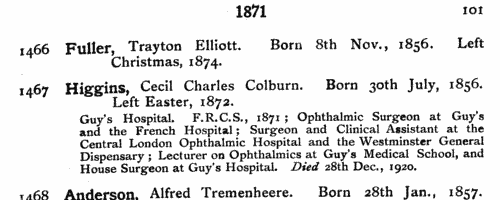
| Dublin Electors
(1865)
This alphabetical list of electors for the City of Dublin for 1865 is annotated with details of the votes cast in the election of 15 July 1865 for a member of Parliament. The candidates were John Vance, Esq., D. L. (V), Benjamin Lee Guinness, Esq., D. L., LL. D. (G), and Jonathan Pim, Esq. (P). The first column gives, in bold, the initial of the ward in which lay the property that was the elector's qualification. The second column gives the elector's sequential number (alphabetically) within that ward. Then the elector's full name is given, surname first, and address, usually including house number. The votes cast are shown on the right: where these columns are blank, the elector did not vote. The key to the ward names is: A, South Dock; B, Donnybrook; C, Rathdown; D, Trinity; E, South City; F, Royal Exchange; G, Mansion House; H, Fitzwilliam; I, Wood Quay; K, Merchants' Quay; L, Usher's Quay; M, Arran Quay; N, Inns' Quay; O, North City; P, Rotundo; Q, Mountjoy; R; North Dock. S indicates the register of freemen.BAYLY. Cost: £4.00.  | Sample scan, click to enlarge
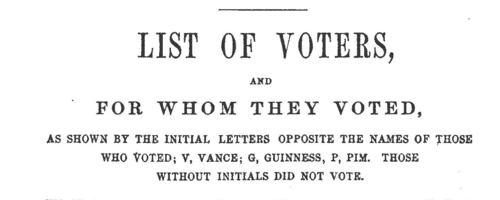
| East Kent Registered Electors: Deal
(1865)
The poll for two knights of the shire to represent the Eastern Division of the county of Kent in parliament was taken 18 July 1865, the candidates being Sir Edward Cholmeley Dering, bart., (D), Sir Brook William Bridges, bart., (B), and Sir Norton Joseph Knatchbull, bart., (K). This poll book lists all registered electors, whether they voted or not, by electoral district (Ashford, Canterbury, Dover, Faversham, Hythe, Margate, Ramsgate, Romney, Sandwich, Sheerness, Sittingbourne, Whitstable and Wingham) and then by township or parish within which lay the property whereby the electors had qualified. The lefthand column gives sequential number in the whole volume; then follows the elector's full name, surname first, and his address (often elsewhere); and on the righthand side for whom he voted. When the elector was qualified in duplicate the vote is recorded opposite to the number upon which he claimed to vote at the polling booth, and wherever his name occurs elsewhere a reference is made, immediately after the address, to the number where his vote is recorded, with the initials of the candidates for whom he voted. Duplicate voters who were dead at the time of the election, or did not vote, are printed in italics to signify that they did not vote, or are stated to be dead once only; and wherever the names of such electors occur elsewhere references are made to the numbers where alone they are reckoned in the abstract of the poll as dead or not voting. Whenever a number only, without any other reference, follows the address, it denotes that at the number referred to, the elector is entered as not voting. BAYLY. Cost: £6.00.  | Sample scan, click to enlarge

| East Kent Registered Electors: Ramsgate
(1865)
The poll for two knights of the shire to represent the Eastern Division of the county of Kent in parliament was taken 18 July 1865, the candidates being Sir Edward Cholmeley Dering, bart., (D), Sir Brook William Bridges, bart., (B), and Sir Norton Joseph Knatchbull, bart., (K). This poll book lists all registered electors, whether they voted or not, by electoral district (Ashford, Canterbury, Dover, Faversham, Hythe, Margate, Ramsgate, Romney, Sandwich, Sheerness, Sittingbourne, Whitstable and Wingham) and then by township or parish within which lay the property whereby the electors had qualified. The lefthand column gives sequential number in the whole volume; then follows the elector's full name, surname first, and his address (often elsewhere); and on the righthand side for whom he voted. When the elector was qualified in duplicate the vote is recorded opposite to the number upon which he claimed to vote at the polling booth, and wherever his name occurs elsewhere a reference is made, immediately after the address, to the number where his vote is recorded, with the initials of the candidates for whom he voted. Duplicate voters who were dead at the time of the election, or did not vote, are printed in italics to signify that they did not vote, or are stated to be dead once only; and wherever the names of such electors occur elsewhere references are made to the numbers where alone they are reckoned in the abstract of the poll as dead or not voting. Whenever a number only, without any other reference, follows the address, it denotes that at the number referred to, the elector is entered as not voting. BAYLY. Cost: £6.00.  | Sample scan, click to enlarge

| Scottish Abstainers
(1865)
Lists of members of the Scottish Temperance League, branch by branch; donations and subscriptions; officers of abstinence societies; and ministers connected with the league. Mostly Scotland, but including England, Ireland and the colonies.
BAYLY. Cost: £6.00.  | Sample scan, click to enlarge
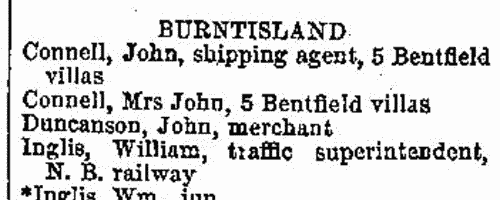
| Boys entering Uppingham School
(1866)
The public school at Uppingham in Rutland was founded by Archdeacon Johnson in 1584. A roll of scholars from 1824 to 1905 was edited by J. P. Graham, and published in 1906. This was a revision and updating of an 1894 edition of the roll, the great bulk of the work having been done by Mrs Mullins. The roll is arranged by year, and within each year by term of entrance, and then alphabetically by surname within each term. Each boy's name is given, surname first, with an asterisk where known (in 1906) to have died. Then there is month and year of birth, father's name (most often just surname and initials) and address (at entrance). Where the boy represented the school at Rugby football (XV) or cricket (XI), that is indicated. After the month and year of leaving the school, there is a brief summary of achievements in later life, and, where known, address as in 1906. BAYLY. Cost: £4.00.  | Sample scan, click to enlarge
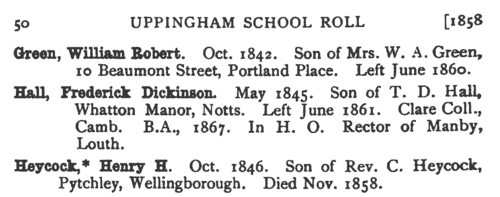
| Boys entering Wellington College in Berkshire
(1866)
Wellington College, near Wokingham, was originally founded for the education of sons of military officers. A register of boys entering the school from First Term 1859 to Michaelmas 1933 was compiled by F. G. Lawrence for the Old Wellingtonian Society. In each entry the boy's name is given in full, in bold, surname first; age at entry (usually 11 to 14); then, in brackets, the name of the dormitory or house to which he belonged, in italics, with the years of his stay; then his father's name (usually surname and initials, but not christian name) with military decorations where appropriate. School prefects and captains are noted as such; if the boy played cricket for the school, XI with the years; academic honours, scholarships, &c.; a brief biography; and date of death, or (where known) address in 1933. Year of marriage is given, and sometimes the wife's name and/or her father's name. Clearly, those boys who kept contact with the school and/or had distinguished military careers have detailed entries; others disappeared into oblivion on leaving.BAYLY. Cost: £6.00.  | Sample scan, click to enlarge
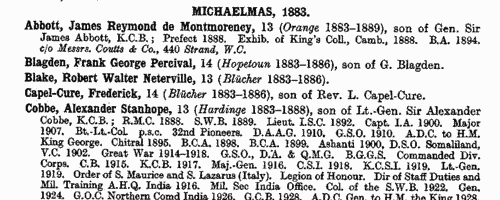
| Farringdon Missionary Contributions (1866)
Contributions (donations, legacies and collecting boxes) from 17 October 1866 to 19 November 1866 to the London Missionary Society. This index includes not only individual contributors but also local collectors and the ministers and treasurers reporting sums collected.
BAYLY. Cost: £8.00.  | Sample scan, click to enlarge

| Members of the Institute of Civil Engineers
(1867)
The Institute of Civil Engineers was established by charter of George IV in 1828. The four classes of the institution were the Members, Associates, Graduates and Honorary Members. This membership list, corrected to 1 January 1867, lists members alphabetically by surname and christian name, with date of election (or, for those who had previously been associates, date of election as associate (A) and date of transfer to member (M)), and address.BAYLY. Cost: £4.00.  | Sample scan, click to enlarge

| Boys entering Wellington College in Berkshire
(1868)
Wellington College, near Wokingham, was originally founded for the education of sons of military officers. A register of boys entering the school from First Term 1859 to Michaelmas 1933 was compiled by F. G. Lawrence for the Old Wellingtonian Society. In each entry the boy's name is given in full, in bold, surname first; age at entry (usually 11 to 14); then, in brackets, the name of the dormitory or house to which he belonged, in italics, with the years of his stay; then his father's name (usually surname and initials, but not christian name) with military decorations where appropriate. School prefects and captains are noted as such; if the boy played cricket for the school, XI with the years; academic honours, scholarships, &c.; a brief biography; and date of death, or (where known) address in 1933. Year of marriage is given, and sometimes the wife's name and/or her father's name. Clearly, those boys who kept contact with the school and/or had distinguished military careers have detailed entries; others disappeared into oblivion on leaving.BAYLY. Cost: £6.00.  | Sample scan, click to enlarge
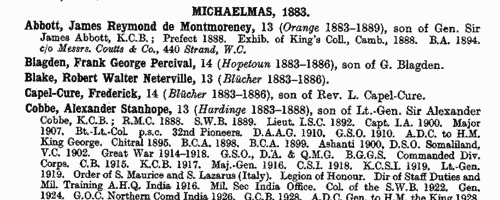
|
Research your ancestry, family history, genealogy and one-name study by direct access to original records and archives indexed by surname.
|












